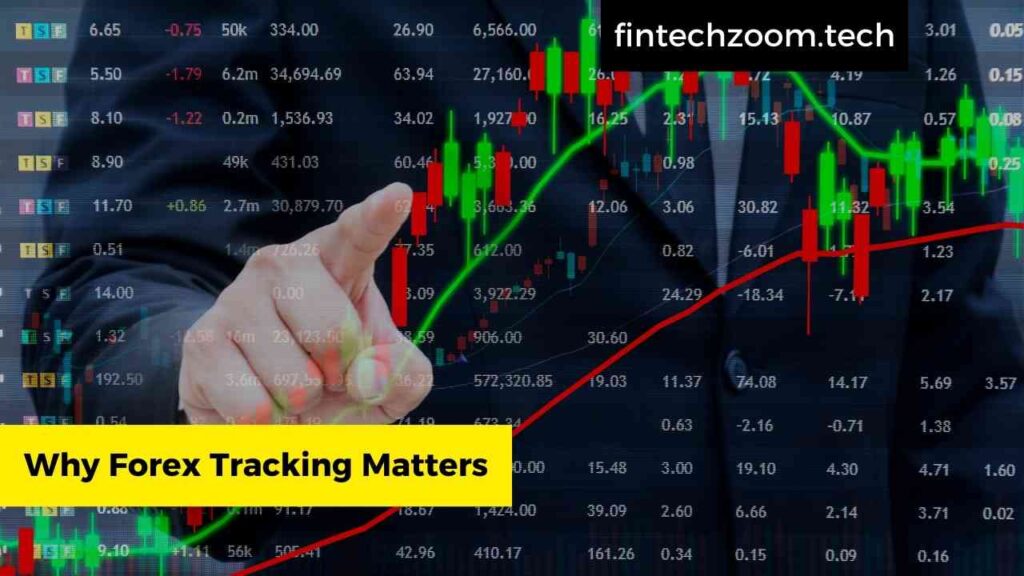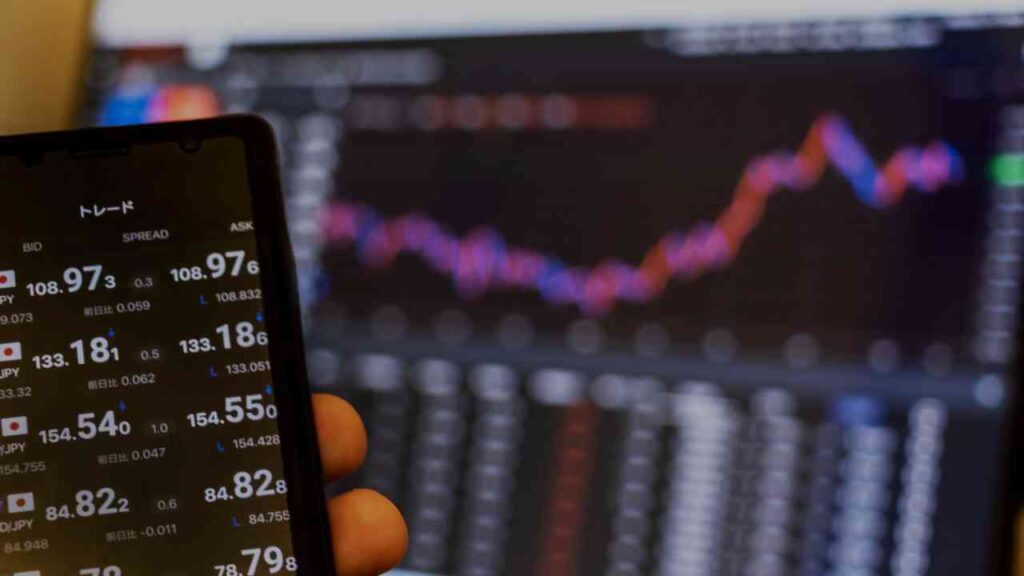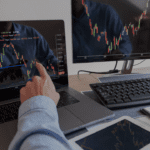Table of Contents
Introduction to Forex Tracking
Welcome to the world of forex tracking, where numbers, trends, and analysis converge to empower traders worldwide. If you’re stepping into the realm of foreign exchange trading or have been a seasoned player, understanding the significance of forex tracking is paramount. It’s not merely about keeping tabs on your transactions; it’s about leveraging data to make informed decisions, mitigate risks, and optimize your trading strategies for success.
Forex tracking encompasses a range of tools and techniques aimed at monitoring, analyzing, and interpreting the dynamics of currency markets. Whether you’re a day trader, swing trader, or long-term investor, integrating robust tracking mechanisms into your trading routine can be the game-changer you’ve been seeking.

Why Forex Tracking Matters
Imagine setting sail on a voyage without a compass or map. That’s akin to trading in the forex market without tracking your progress. Forex tracking provides you with the compass and map, guiding you through the tumultuous waters of currency fluctuations. By monitoring your trades, analyzing market data, and identifying patterns, you gain invaluable insights into your trading performance and market behavior.
In the fast-paced world of forex trading, every decision counts. With accurate tracking, you can evaluate the effectiveness of your trading strategies, identify areas for improvement, and adapt to changing market conditions swiftly. Moreover, by keeping a meticulous record of your trades, you cultivate discipline and accountability, essential traits for success in the forex arena.
Types of Forex Tracking Tools
In your arsenal of forex tracking tools, you’ll encounter a diverse array of options tailored to suit various trading styles and preferences. From simple spreadsheets to sophisticated software solutions, the choices are plentiful. Let’s explore some popular types of forex tracking tools:
1. Spreadsheet Solutions: For traders who prefer a hands-on approach, spreadsheets offer a flexible and customizable tracking solution. With platforms like Microsoft Excel or Google Sheets, you can create personalized trade journals, performance trackers, and analytical models to suit your specific requirements.
2. Trading Platforms: Many online trading platforms come equipped with built-in tracking features that allow you to monitor your trades, analyze performance metrics, and access real-time market data seamlessly. Whether you’re using MetaTrader, NinjaTrader, or another platform, explore the tracking capabilities it offers to maximize your trading efficiency.
The Power of Trade Journals
At the heart of effective forex tracking lies the humble trade journal. Think of it as your trading diary, documenting every trade you execute, along with pertinent details such as entry and exit points, position size, and rationale behind your decisions. While it may seem mundane, maintaining a comprehensive trade journal can yield profound benefits.
First and foremost, a trade journal provides you with a historical record of your trades, enabling you to review past performance objectively. By scrutinizing your successes and failures, you can glean valuable insights into your trading patterns, strengths, and weaknesses. Moreover, a trade journal facilitates accountability and discipline, as you’re compelled to justify each trade and learn from both triumphs and setbacks.
Leveraging Technical Analysis Tools
Technical analysis serves as the cornerstone of many forex tracking strategies, offering traders a systematic approach to interpreting market dynamics. By analyzing price charts, identifying patterns, and applying technical indicators, you can gain valuable insights into market trends and potential trade opportunities.
One of the fundamental principles of technical analysis is trend identification. By assessing the direction and strength of price movements, you can determine whether a currency pair is in an uptrend, downtrend, or ranging phase. This insight allows you to align your trades with the prevailing market sentiment, increasing the probability of success.

Harnessing the Power of Fundamental Analysis
While technical analysis focuses on price action and chart patterns, fundamental analysis delves into the underlying economic factors driving currency movements. By monitoring economic indicators, geopolitical developments, and central bank policies, you can gain a deeper understanding of the forces shaping the forex market.
Fundamental analysis enables traders to anticipate market trends and identify potential catalysts for currency fluctuations. For example, if a country’s economy shows signs of robust growth, it may strengthen its currency relative to others. Conversely, geopolitical tensions or economic downturns can lead to currency depreciation. By staying abreast of fundamental developments, you can make informed trading decisions and capitalize on market opportunities.
Risk Management Strategies
In the world of forex trading, risk is an ever-present reality. However, by implementing sound risk management strategies, you can mitigate potential losses and protect your capital. Forex tracking plays a pivotal role in this regard, enabling you to assess risk factors, set appropriate stop-loss levels, and manage position sizes effectively.
One widely-used risk management tool is the concept of position sizing. Rather than risking a fixed monetary amount on each trade, position sizing adjusts the size of your positions based on factors such as account size, risk tolerance, and market volatility. By adhering to a consistent position sizing strategy, you can limit your exposure to risk and preserve your trading capital over the long term.
Embracing Automation with Trading Algorithms
In the age of digital innovation, automation has emerged as a powerful ally for forex traders. Trading algorithms, also known as expert advisors or EAs, utilize predefined rules and algorithms to execute trades automatically based on predetermined criteria. By harnessing the power of automation, traders can eliminate emotional biases, execute trades with precision, and capitalize on fleeting market opportunities.
Forex tracking plays a crucial role in the development and optimization of trading algorithms. By backtesting historical data and analyzing performance metrics, traders can fine-tune their algorithms for optimal results. Moreover, by monitoring real-time market data and adjusting parameters as needed, traders can ensure that their algorithms remain adaptive and responsive to changing market conditions.
Diversification and Portfolio Management
Diversification is a fundamental principle of investment strategy, and forex trading is no exception. By spreading your investments across multiple currency pairs, asset classes, and trading strategies, you can reduce the overall risk in your portfolio and enhance your chances of long-term success. Forex tracking enables you to monitor the performance of individual trades and assess the overall health of your portfolio.
Portfolio management goes hand in hand with diversification, as it involves optimizing the allocation of capital across various assets and strategies. By conducting regular portfolio reviews and rebalancing as needed, you can ensure that your investments remain aligned with your financial goals and risk tolerance. Forex tracking tools provide you with the insights and data you need to make informed decisions about portfolio composition and allocation.

The Importance of Continuous Learning and Adaptation
In the dynamic world of forex trading, one thing is certain: change is constant. Market conditions evolve, economic landscapes shift, and new technologies emerge, reshaping the way we trade currencies. To thrive in this ever-changing environment, traders must embrace a mindset of continuous learning and adaptation.
Forex tracking serves as a catalyst for learning and adaptation, providing traders with valuable feedback on their performance and strategies. By analyzing past trades, identifying areas for improvement, and experimenting with new approaches, traders can refine their skills and stay ahead of the curve. Whether it’s mastering a new technical indicator, studying economic trends, or exploring innovative trading strategies, the pursuit of knowledge is a never-ending journey for forex traders.
Overcoming Psychological Challenges
Trading forex isn’t just about analyzing charts and executing trades; it’s also about managing the psychological challenges that come with it. Fear, greed, and overconfidence are just a few of the emotions that can cloud judgment and derail trading strategies. Forex tracking can help mitigate these psychological challenges by fostering discipline, accountability, and emotional detachment.
By maintaining a detailed trade journal, traders can objectively evaluate their performance and identify patterns of behavior that may be undermining their success. Moreover, by setting clear goals, adhering to predefined trading rules, and practicing mindfulness techniques, traders can cultivate a resilient mindset that enables them to navigate the ups and downs of the market with equanimity.
Building a Supportive Community
Trading forex can be a solitary endeavor, but it doesn’t have to be. Building a supportive community of fellow traders can provide invaluable camaraderie, encouragement, and insights along your trading journey. Whether it’s joining online forums, attending trading meetups, or participating in social media groups, connecting with like-minded individuals can enhance your trading experience and accelerate your learning curve.
Forex tracking can also foster collaboration within your trading community. By sharing trade ideas, discussing market trends, and exchanging feedback on trading strategies, you can tap into the collective wisdom of your peers and gain fresh perspectives on the forex market. Moreover, by surrounding yourself with positive, supportive individuals who share your passion for trading, you can stay motivated and resilient in the face of challenges.
The Role of Mentorship and Education
While self-directed learning is essential for growth as a forex trader, mentorship and formal education can provide invaluable guidance and expertise. Whether it’s learning from experienced traders, enrolling in online courses, or attending seminars and workshops, investing in your education can pay dividends in your trading journey.
Forex tracking can enhance the efficacy of mentorship and education by providing tangible data and insights to supplement theoretical knowledge. By analyzing real-world trading scenarios, discussing trade outcomes with mentors, and applying lessons learned to your own trading activities, you can accelerate your learning curve and avoid common pitfalls along the way. Remember, the path to mastery is paved with continuous learning and a willingness to seek guidance from those who have walked the path before you.

Adhering to a Trading Plan
Consistency is key in forex trading, and a well-defined trading plan serves as your roadmap to success. A trading plan outlines your trading goals, risk tolerance, entry and exit criteria, and overarching strategy. By adhering to your plan with discipline and precision, you can maintain consistency in your trading approach and avoid impulsive decision-making.
Forex tracking plays a crucial role in the execution and evaluation of your trading plan. By monitoring your trades against predefined criteria, analyzing performance metrics, and adjusting your plan as needed, you can ensure that you stay on course toward your financial objectives. Moreover, by maintaining a detailed record of your trades, you can identify deviations from your plan and take corrective action to realign your trading activities with your strategic goals.
Staying Informed and Adaptive
The forex market is a dynamic and ever-changing landscape, shaped by a myriad of economic, political, and social factors. Staying informed and adaptive is essential for success in this fast-paced environment. Forex tracking enables you to stay abreast of market developments, monitor key indicators, and adjust your trading strategies accordingly.
Whether it’s keeping an eye on central bank announcements, economic reports, or geopolitical events, staying informed about factors that influence currency movements is crucial for making informed trading decisions. Moreover, by remaining adaptive and responsive to changing market conditions, you can capitalize on emerging opportunities and mitigate potential risks. Remember, in the world of forex trading, knowledge is power, and staying informed is your greatest asset.
The Evolution of Forex Tracking Technology
As technology continues to advance at a rapid pace, so too does the evolution of forex tracking technology. From simple spreadsheets to sophisticated algorithmic trading platforms, the tools available to forex traders have become increasingly powerful and accessible. Today, traders can leverage a wealth of cutting-edge technologies to track, analyze, and optimize their trading activities like never before.
One of the most significant advancements in forex tracking technology is the rise of cloud-based solutions. By harnessing the scalability, flexibility, and accessibility of the cloud, traders can access their trading data from anywhere in the world, on any device. Moreover, cloud-based platforms offer advanced analytics, machine learning capabilities, and real-time market data integration, empowering traders to make data-driven decisions with precision and confidence.
Optimizing Your Forex Tracking Strategy
With an abundance of forex tracking tools and techniques at your disposal, optimizing your tracking strategy is essential for maximizing your trading success. Start by assessing your trading objectives, risk tolerance, and preferred trading style. Are you a day trader looking to capitalize on short-term price fluctuations, or are you a long-term investor seeking to build wealth over time?
Next, evaluate the tracking tools and techniques that align with your trading goals and preferences. Whether it’s trade journals, technical analysis software, or algorithmic trading platforms, choose tools that provide the insights and functionality you need to achieve your objectives. Finally, commit to regular review and refinement of your tracking strategy, adjusting as needed to stay ahead of the curve and capitalize on market opportunities.

The Psychology of Trading Success
While technical prowess and market analysis are essential components of forex trading, mastering the psychology of trading is equally crucial. Successful traders possess a mindset characterized by discipline, patience, and emotional resilience. They approach trading with a calm, rational demeanor, free from the influence of fear, greed, or ego.
Forex tracking can play a pivotal role in cultivating a resilient trading mindset. By maintaining a detailed trade journal, analyzing past performance, and learning from both successes and failures, traders can develop self-awareness and emotional intelligence. Moreover, by adhering to a well-defined trading plan, practicing risk management, and embracing a growth mindset, traders can navigate the challenges of the market with confidence and composure.
The Future of Forex Tracking
As we look to the future, the landscape of forex tracking continues to evolve, driven by technological innovation, changing market dynamics, and shifting trader preferences. From artificial intelligence and machine learning to blockchain technology and decentralized finance, the possibilities are endless.
One promising development on the horizon is the integration of artificial intelligence and machine learning algorithms into forex tracking platforms. By leveraging vast amounts of historical data, predictive analytics, and pattern recognition capabilities, AI-powered tracking tools can provide traders with unprecedented insights and decision-making support. Moreover, advancements in blockchain technology hold the potential to revolutionize transparency, security, and trust in forex tracking, enabling traders to transact with confidence in a decentralized ecosystem.
Also Read: EXPLORING THE DEPTHS OF OPEN CARE LIFE INSURANCE 2024
Conclusion
In conclusion, forex tracking is a multifaceted discipline that lies at the heart of successful trading. By leveraging a diverse array of tools, techniques, and strategies, traders can monitor their performance, analyze market trends, and optimize their trading activities for maximum profitability. Whether you’re a novice trader or a seasoned veteran, integrating robust tracking mechanisms into your trading routine is essential for navigating the complexities of the forex market with confidence and precision.
So, embrace the power of forex tracking, cultivate a disciplined trading mindset, and stay informed about market developments. Remember, success in forex trading is not a sprint but a marathon. By committing to continuous learning, adaptation, and improvement, you can unlock your full potential as a forex trader and achieve your financial goals.
Faq About Forex Tracking
Q1: What is forex tracking?
Ans: Forex tracking refers to the process of monitoring, analyzing, and interpreting data related to currency markets and trading activities. It involves keeping meticulous records of trades, analyzing market trends, and using various tools and techniques to evaluate trading performance. Forex tracking enables traders to make informed decisions, mitigate risks, and optimize their trading strategies for success.
Q2: How long does it take for forex cargo to deliver?
Ans: The delivery time for forex cargo can vary depending on factors such as the shipping destination, shipping method, and any customs clearance procedures. Typically, forex cargo delivery within the same country may take a few days to a week, while international shipments may take longer, ranging from one to four weeks or more, depending on the distance and shipping conditions.
Q3: What to check before trading forex?
Ans: Before trading forex, it’s essential to conduct thorough research and due diligence to ensure you’re well-prepared and informed. Some key factors to check before trading forex include:
- Market Conditions: Assess the current state of the forex market, including currency pairs’ volatility, liquidity, and recent price movements.
- Economic Indicators: Stay informed about economic news, such as interest rate decisions, employment reports, and GDP growth, as they can influence currency prices.
- Trading Plan: Develop a clear trading plan outlining your goals, risk tolerance, entry and exit criteria, and overall strategy.
- Risk Management: Implement effective risk management strategies, such as setting stop-loss orders, diversifying your portfolio, and managing position sizes to protect your capital.
- Broker Reputation: Choose a reputable forex broker with a track record of reliability, transparency, and regulatory compliance.
- Trading Platform: Select a user-friendly trading platform with robust features, real-time market data, and secure transaction capabilities.
Q4: Is there a weight limit for forex cargo?
Ans: Yes, there is typically a weight limit for forex cargo shipments, which varies depending on the shipping company, shipping method, and destination. While domestic shipments may have weight limits ranging from 50 to 100 pounds per package, international shipments may have stricter weight restrictions due to airline regulations and cargo handling considerations. It’s advisable to check with your chosen forex cargo service provider for specific weight limits and shipping guidelines before sending your package.
Q5: Additional Question: How can I track my forex cargo shipment?
Ans: To track your forex cargo shipment, you can usually use the tracking number provided by your shipping company or forex cargo service provider. Simply visit their website, enter the tracking number into the designated tracking tool or field, and you’ll receive real-time updates on your shipment’s status, including its location, estimated delivery time, and any relevant delivery notifications. If you encounter any issues or have questions about tracking your forex cargo shipment, don’t hesitate to contact your shipping provider’s customer service for assistance.














1 thought on “The Power of Forex Tracking A Comprehensive Guide 2024”